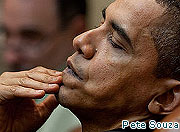Barack Obama was not telling the truth when he told a church event he believed marriage was between one man and one woman, according to a former senior adviser.
David Axelrod, currently an election campaign adviser to the Labour Party, said the former Senator “modified his position” on the issue of same-sex marriage as he sought higher office.
When running for President in 2008, Obama said he believed marriage “is the union between a man and a woman”, but in 2012 he said same-sex couples “should be able to get married”.
Nagging issue
Axelrod, writing in a new book, said: “Gay marriage was a particularly nagging issue. For as long as we had been working together, Obama had felt a tug between his personal views and the politics of gay marriage.”
He added: “Opposition to gay marriage was particularly strong in the black church, and as he ran for higher office, he grudgingly accepted the counsel of more pragmatic folks like me, and modified his position to support civil unions rather than marriage”.
California – which has the largest number of electoral college votes and is generally regarded as one of the USA’s most liberal states – voted in favour of marriage between one man and one woman on the same day it backed Obama for President in 2008.
Political purposes
In August of the election year, Obama told Pastor Rick Warren and assembled Christians that he believed in traditional marriage, describing it as a “sacred union”.
However, in 2012, he told ABC News that “it is important for me to go ahead and affirm that I think same-sex couples should be able to get married”.
Following his later comments, pro-marriage group Alliance Defense Fund spoke out, saying the institution is not “something that politicians should attempt to redefine for political purposes”.
Religious sensitivities
Axelrod’s account has been challenged by President Obama, who told BuzzFeed News that the former aide is “mixing up my personal feelings with my position on the issue”.
He added: “I always felt that same-sex couples should be able to enjoy the same rights, legally, as anybody else, and so it was frustrating to me not to, I think, be able to square that with what were a whole bunch of religious sensitivities out there.”

